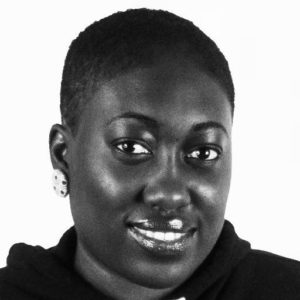 Behold Music & Mental Health, a feature we hope to bring you more often than not, written by the fabulous Imade Borha. She’ll check in from time to time with her thoughts on … well … presumably, music and mental health. Duh. If you dig, you can follow her on Twitter here. Enjoy!
Behold Music & Mental Health, a feature we hope to bring you more often than not, written by the fabulous Imade Borha. She’ll check in from time to time with her thoughts on … well … presumably, music and mental health. Duh. If you dig, you can follow her on Twitter here. Enjoy!
If you’re a member of a marginalized group, your existence is resistance. On November 9, I never felt my existence more threatened on both a national and local level. I stayed up until 5 a.m. so disturbed by the news of our presidential election that I called my social activist friend in New York and joked about bomb shelters to keep the pain at bay. I tried to muster up the energy to get ready for work later that morning, but fortunately, I didn’t have to. My boss let me take the day off. Like a child scared by a nightmare, I kept the covers up to my ears and spent the day in bed. As the KKK celebrated in my home state of North Carolina, I retreated inside. My apartment is surrounded by Trump signs large and small. I braced myself to see anti-black graffiti on my car when I left for work. I’m perpetually flinching, preparing for the pain to come.
I live in two worlds, and with clinical depression, those worlds could possibly be three. I live in reality, I live in the worst case scenario as a black woman, and I live in a world of where the smallest trigger can tip me towards a spiral of sadness. I’m a journalist, a police brutality victim, and a mentally ill person all at the same time. And with the presidential election, each world is heightened with fear. I feel my work isn’t important enough, I feel my neighbors can kill me with immunity just as much as the police, and I feel I’m not mentally strong enough to witness the near endless list of racial intimidation that makes me concerned for my Jewish, Muslim, LGBTQ, and POC friends.
The biggest lesson that Trump’s America is teaching me is acceptance. I’m not okay, and probably won’t be okay, but I can survive by giving myself a chance to live.
Music of survival is what allowed my ancestors to thrive when they faced brutality that could have made them extinct. Slave songs birthed blues and gospel, and gospel birthed me. In gospel, I find messages that accept pain and purpose, defeat and destiny. Gospel’s DNA is in everything, including the call and response of Rae Sremmurd’s “Black Beatles” and the against-the-odds hope of Ahzay’s “Nothing.”
This black woman has a life much more complicated than Donald Trump’s stereotype that every African-American lives poor in the inner-city. If he could open his eyes to see and his ears to hear, he would realize that not every Mexican is a rapist, that not every Muslim is a terrorist, and not every woman is a sexual object to be conquered.
When I’m filled with these frustrations, I wrap music of resistance around me like a warm blanket. I have music when I’m “Weary” like Solange, passionate for “Freedom” like Beyonce, and on “Fire” with rage like Rapsody. I’m reminded that I’m not alone, and that there are people from my neighbors to my friends who want me to feel safe in my skin. Music gives me a sense of acceptance, and the strength to hug my loved ones tighter.
https://www.youtube.com/watch?v=KW7K0gzud5s
